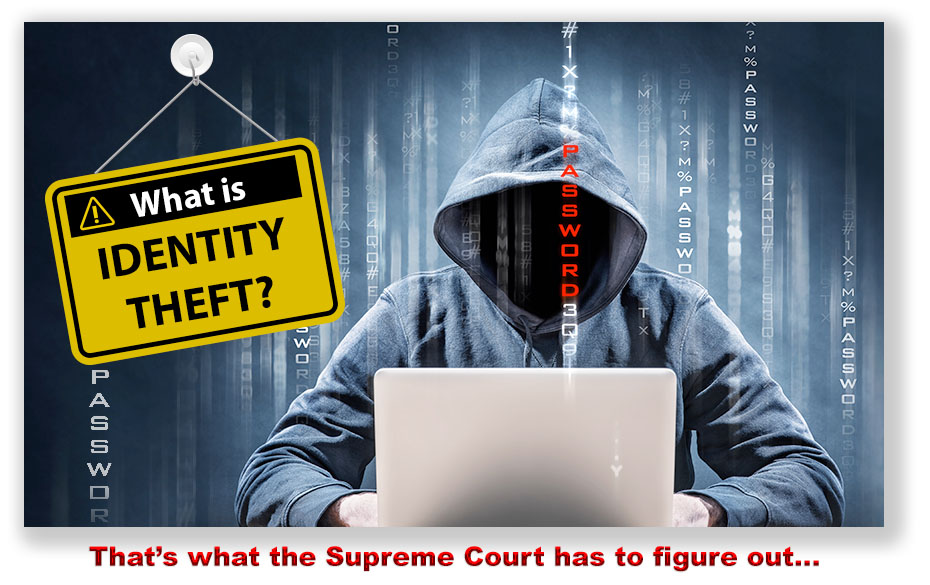We post news and comment on federal criminal justice issues, focused primarily on trial and post-conviction matters, legislative initiatives, and sentencing issues.

AGGRAVATED IDENTITY THEFT HAS ROUGH RIDE AT SCOTUS
 The government’s habit of using the two-year mandatory consecutive minimum sentence for aggravated identity theft provided by 18 USC § 1028A as a cudgel against simple fraud took its own beating during last week’s Supreme Court oral argument.
The government’s habit of using the two-year mandatory consecutive minimum sentence for aggravated identity theft provided by 18 USC § 1028A as a cudgel against simple fraud took its own beating during last week’s Supreme Court oral argument.
The case concerned David Dubin, who was convicted of healthcare fraud. Dubin was accused of bilking Medicaid by misrepresenting who had conducted medical testing and rounding up the time spent carrying out each test from 2.5 to 3 hours, so that a bill submitted for services to Peter Patient was higher than it should have been.
Dubin’s sentence included a two-year mandatory minimum term for “aggravated identity theft” because the Medicaid submission included the identity of the patient but misrepresented the particulars of the test. As The New York Times put it and countless federal defendants who have been clobbered by § 1028A’s extra two-year consecutive sentence, the statute “does not seem to require identity theft in the ordinary understanding of that phrase.”
Dubin’s lawyer argued that his client had not used a patient’s identity in any meaningful way: “It has to be a lie about who receives services or who obtains services,” he said, “not a lie about how those services were rendered.”
The Supreme Court was generally sympathetic. Justice Neil Gorsuch said, “If the government’s theory is correct and every time I order salmon at a restaurant I’m told it’s fresh, but it’s frozen, and my credit card is run for fresh salmon, that’s identity theft.” The government’s position in the case, Gorsuch suggested, would transform everyday fraud into identity theft “whether it’s in a restaurant billing scenario, a health care billing scenario, or lawyers who round their hours up.”
Justice Ketanji Jackson appeared to agree. “It’s like every fraud in the world,” she told the government’s lawyer, “And you just admitted in response to Justice Thomas that it could be a teeny, teeny fraud.”
Justice Sonia Sotomayor said “the vagueness” of the statute—a due process issue—”is a problem.” She noted that it is hard to nail down the government’s definition of the crime “because every time you point to something that seems absurd, they come up with a limiting rule.” She complained that “the issue of vagueness permeates this statute,” and mentioned the rule of lenity, which favors a narrow reading of ambiguous criminal laws.
Justice Clarence Thomas asked the government where its position that any fraud, no matter how small, “stand[s] in terms of vagueness, notice to the world, fair notice to the world? I’m not sure most waiters in America appreciate that they’re committing identity theft when they bill for that bottle of wine.”
 Dubin’s lawyer said said § 1028A’s mandatory minimum sentence was “a very strong cudgel to use against people to procure pleas in very low-level fraud cases. And that’s not what Congress [] aimed for in this case. Congress wasn’t trying to create a two-year mandatory minimum all of a sudden for ordinary fraud offenses. It was aimed at a particular new form of misconduct that’s simply not present in the words ‘aggravated identity theft.’”
Dubin’s lawyer said said § 1028A’s mandatory minimum sentence was “a very strong cudgel to use against people to procure pleas in very low-level fraud cases. And that’s not what Congress [] aimed for in this case. Congress wasn’t trying to create a two-year mandatory minimum all of a sudden for ordinary fraud offenses. It was aimed at a particular new form of misconduct that’s simply not present in the words ‘aggravated identity theft.’”
Dubin v. United States, Case No. 22-10 (Oral argument, Feb 27, 2023)
The New York Times, Supreme Court Seems Skeptical of Broad Sweep of Identity Theft Law (February 27, 2023)
Reason, SCOTUS Questions the Government’s Absurdly Broad Definition of ‘Aggravated Identity Theft’ (March 2, 2023)
– Thomas L. Root

